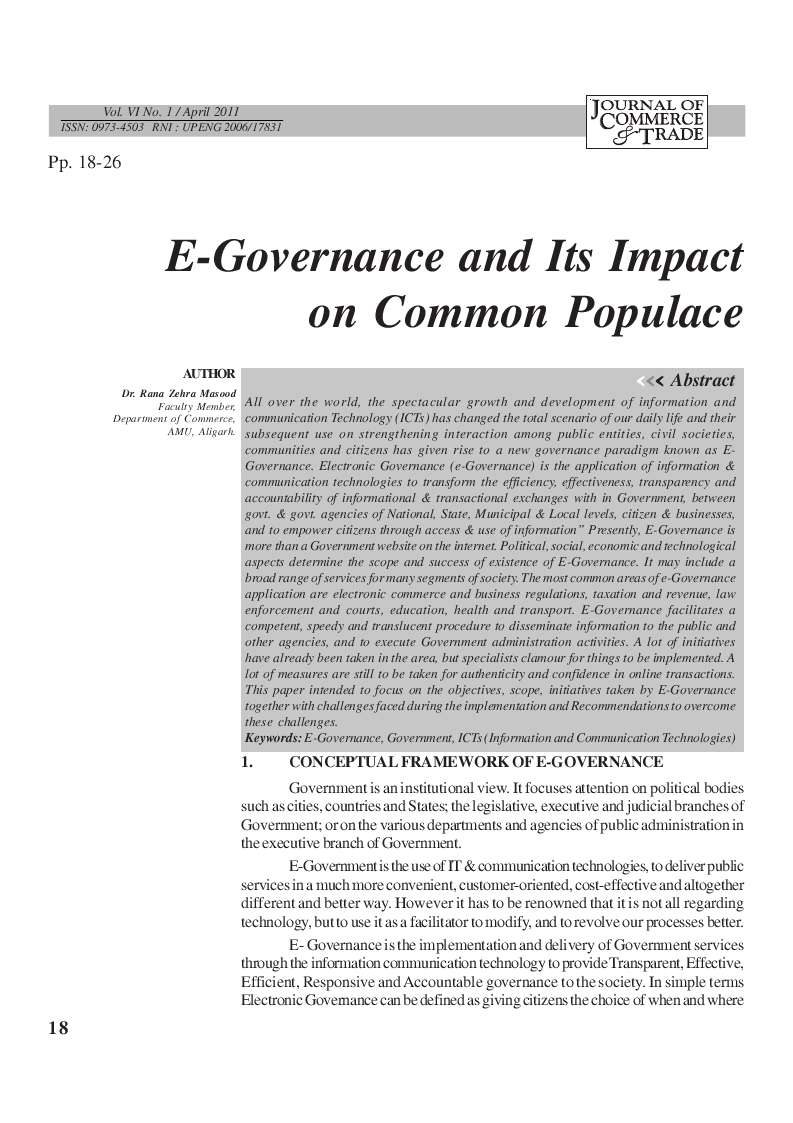E-Governance and Its Impact on Common Populace
DOI:
https://doi.org/10.26703/jct.v6i1.347Keywords:
E-Governance, Government, ICT, TechnologyAbstract
All over the world, the spectacular growth and development of information and communication Technology (ICTs) has changed the total scenario of our daily life and their subsequent use on strengthening interaction among public entities, civil societies, communities and citizens has given rise to a new governance paradigm known as E-Governance. Electronic Governance (e-Governance) is the application of information & communication technologies to transform the efficiency, effectiveness, transparency and accountability of informational & transactional exchanges with in Government, between govt. & govt. agencies of National, State, Municipal & Local levels, citizen & businesses, and to empower citizens through access & use of information” Presently, E-Governance is more than a Government website on the internet. Political, social, economic and technological aspects determine the scope and success of existence of E-Governance. It may include a broad range of services for many segments of society. The most common areas of e-Governance application are electronic commerce and business regulations, taxation and revenue, law enforcement and courts, education, health and transport. E-Governance facilitates a competent, speedy and translucent procedure to disseminate information to the public and other agencies, and to execute Government administration activities. A lot of initiatives have already been taken in the area, but specialists clamour for things to be implemented. A lot of measures are still to be taken for authenticity and confidence in online transactions. This paper intended to focus on the objectives, scope, initiatives taken by E-Governance together with challenges faced during the implementation and Recommendations to overcome these challenges.
Downloads
References
Agnihotri, V.K. and Ramani, K.V. (2001) Change Management and Process Re-engineering, Presentation at the Roundtable on IT in Governance, 12 January, New Delhi.
Aichholzer, G. (2004) ‘Scenarios of e-Government in 2010 and implications for strategy design’, Electronic Journal of e-Government. Volume 2, Issue 1
Backus, M. (2001) E-Governance and Developing Countries, Introduction and
Bedi, K., Singh, P.J. & Srivastava, S. (2001) government net: new governance opportunities for India. New Delhi: Sage.
Bedi, Kiran & Singh.P.J, (2001) Government Net: New governance opportunities for India, Sage Publications, New Delhi
Berleur, Jacques (1997) Culture and Democracy Revisited in the Global Information Society, Information Technology in Developing Countries 7(1).
Budhiraja, Renu (2001) Electronic Governance a Key Issue in the 21st Century, Ministry of Information Technology, India. Centre for the Development of Advanced Computing (CDAC) (2000) Towards E-governance, 10 December, 1999, Bangalore, India.
Commerce, E-Government and Mobile Commerce, Mehdi Khosrow-Pour,Conference, June 17, Santa Fe, New Mexico, U.S.A.examples, Research Report, No. 3, April 2001
Fraga, E. (2002) “Trends in e-Government: How to Plan, Design, and Measure e-Government”. Government Management Information Sciences (GMIS) Government Journal, 1(2), 2004, pp. 198-212.
Information Resources Management Association, Idea Group Reference, USA, pp.373-378. 2006.
Leitner, C. (2003) E-Government in Europe: The State of Affairs, European Institute of Public Administration, Maastricht, the Netherlands.
NIC (National Informatics Centre) (2007): Directory of Indian Government Websites, New Delhi, and July 9, available at http://goidirectory.nic.in/statistics.asp (accessed: July 10, 2007)
Riley, T.B. (2003) E-government vs. E-governance: Examining the Difference in a Changing Public Sector Climate, The Commonwealth Secretariat and Government Telecommunications and Information Services, Public Works and Government Services, Canada.
Sharma, S. K. (2006) an E-Government Services Framework, Encyclopedia of
Sharma, S.K. (2004) Assessing E-government Implementations, Electronic
Sheridan, W., and Riley, T.B. (2006) Commonwealth Centre for e-Governance, e- Gov Monitor, Monday, 3 July, 2006.
Planning commission, Tenth Five Year Plan, revised March 15th, 2002, www.eivc.org

Downloads
Published
Issue
Section
License
Copyright (c) 2011 Dr. Rana Zehra Masood

This work is licensed under a Creative Commons Attribution 4.0 International License.










